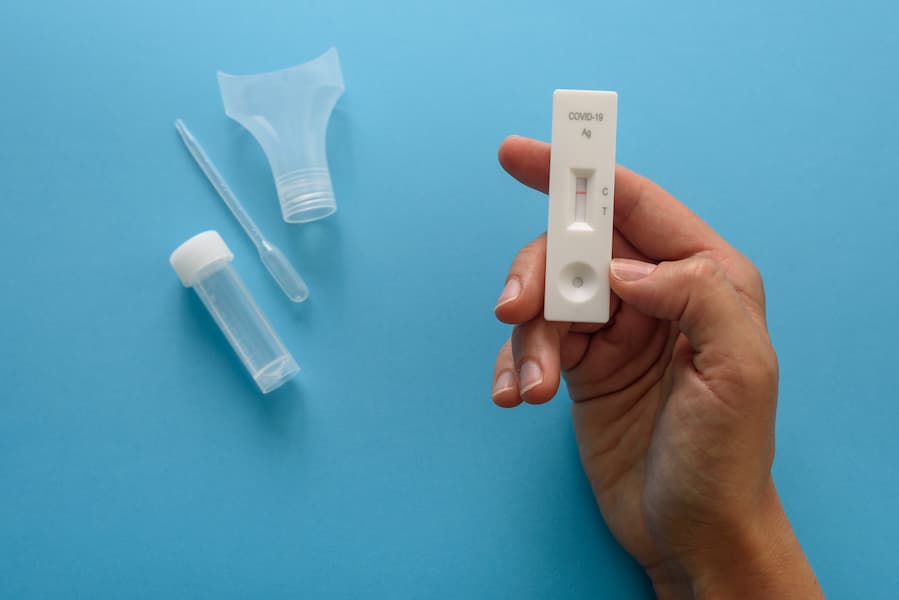Divided Court Stays OSHA Vaccine or Test Mandate While Allowing CMS Vaccination Rule to Proceed

On January 13, the U.S. Supreme Court issued decisions in two closely-watched cases involving vaccine mandates imposed by the Biden Administration. In National Federation of Independent Business v. Department of Labor, Occupational Safety and Health Administration, the Court held that the vaccine-or-testing rule established by the U.S. Department of Labor’s Occupational Safety and Health Administration (OSHA) can’t go into effect while lawsuits are pending. However, held in Biden v. Missouri , the Court ruled that the Centers for Medicare & Medicaid Services (CMS) rule should be allowed to take effect nationwide as the lower courts consider legal challenges.
NFIB v. OSHA
On November 4, 2021, OSHA published an emergency temporary standard implementing the Biden Administration’s mandate that all employers with 100 or more employees require vaccination or, as an alternative, weekly testing.
Many States, businesses, and nonprofit organizations challenged OSHA’s rule in Courts of Appeals across the country. The Fifth Circuit initially entered a stay. However, after the cases were consolidated before the Sixth Circuit, that court lifted the stay and allowed OSHA’s rule to take effect. The challengers sought emergency relief from the Supreme Court, arguing that OSHA’s mandate exceeds its statutory authority and is otherwise unlawful.
By a vote of 6-3, the Supreme Courtheld that a stay of OSHA’s vaccine-or-testing regime is justified because OSHA exceeded its authority in issuing the ETS. “Permitting OSHA to regulate the hazards of daily life — simply because most Americans have jobs and face those same risks while on the clock — would significantly expand OSHA’s regulatory authority without clear congressional authorization,” the Court wrote.
The Court further found that it was not its role to weigh the tradeoffs of the vaccine mandate, including the challengers’ argument that it would cost businesses billions of dollars and force many employees to quit and the federal government’s assertion that vaccination could save lives and avoid hospitalizations. Such decisions should fall on Congress, according to the Court.
“Although Congress has indisputably given OSHA the power to regulate occupational dangers, it has not given that agency the power to regulate public health more broadly. Requiring the vaccination of 84 million Americans, selected simply because they work for employers with more than 100 employees, certainly falls in the latter category,” the majority wrote.
Biden v. Missouri
In November 2021, the Secretary of Health and Human Services, which administers the Medicare and Medicaid programs, announced that, in order to receive Medicare and Medicaid funding, participating facilities must ensure that their staff—unless exempt for medical or religious reasons—are vaccinated against COVID–19. Two District Courts enjoined enforcement of the rule, and the Government now asked the Supreme Court to stay those injunctions.
By a vote of 5-4, the Court held that the CMS rule should be allowed to take effect. According to the majority, the Secretary of Health and Human Services was within his authority in imposing the vaccine mandate on healthcare workers.
“The challenges posed by a global pandemic do not allow a federal agency to exercise power that Congress has not conferred upon it,” the majority explained. “At the same time, such unprecedented circumstances provide no grounds for limiting the exercise of authorities the agency has long been recognized to have.”
The majority also emphasized that healthcare facilities that wish to participate in Medicare and Medicaid have routinely been required to satisfy a host of conditions that address the safe and effective provision of healthcare, not simply sound accounting. Similarly, the Secretary regularly imposes conditions of participation that relate to the qualifications and duties of healthcare workers themselves. “The Secretary of Health and Human Services determined that a COVID–19 vaccine mandate will substantially reduce the likelihood that healthcare workers will contract the virus and transmit it to their patients. He accordingly concluded that a vaccine mandate is ‘necessary to promote and protect patient health and safety’ in the face of the ongoing pandemic,” the Court wrote. “The rule thus fits neatly within the language of the statute.”
Previous Articles
SCOTUS Rules State Can’t Immunize Parties from Federal Civil Liability
by DONALD SCARINCI on January 29, 2026
In John Doe v. Dynamic Physical Therapy, LLC, 607 U.S. ____ (2025) the U.S. Supreme Court held that...
Supreme Court to Address Racial Discrimination in Jury Selection
by DONALD SCARINCI onWhile the U.S. Supreme Court has concluded oral arguments for the year, it continues to add cases t...
Supreme Court Halts Deployment of National Guard to Chicago
by DONALD SCARINCI on
In Trump v. Illinois, 607 U.S. ____ (2025), the U.S. Supreme Court refused to stay a district court...
The Amendments
-
Amendment1
- Establishment ClauseFree Exercise Clause
- Freedom of Speech
- Freedoms of Press
- Freedom of Assembly, and Petitition
-
Amendment2
- The Right to Bear Arms
-
Amendment4
- Unreasonable Searches and Seizures
-
Amendment5
- Due Process
- Eminent Domain
- Rights of Criminal Defendants
Preamble to the Bill of Rights
Congress of the United States begun and held at the City of New-York, on Wednesday the fourth of March, one thousand seven hundred and eighty nine.
THE Conventions of a number of the States, having at the time of their adopting the Constitution, expressed a desire, in order to prevent misconstruction or abuse of its powers, that further declaratory and restrictive clauses should be added: And as extending the ground of public confidence in the Government, will best ensure the beneficent ends of its institution.





